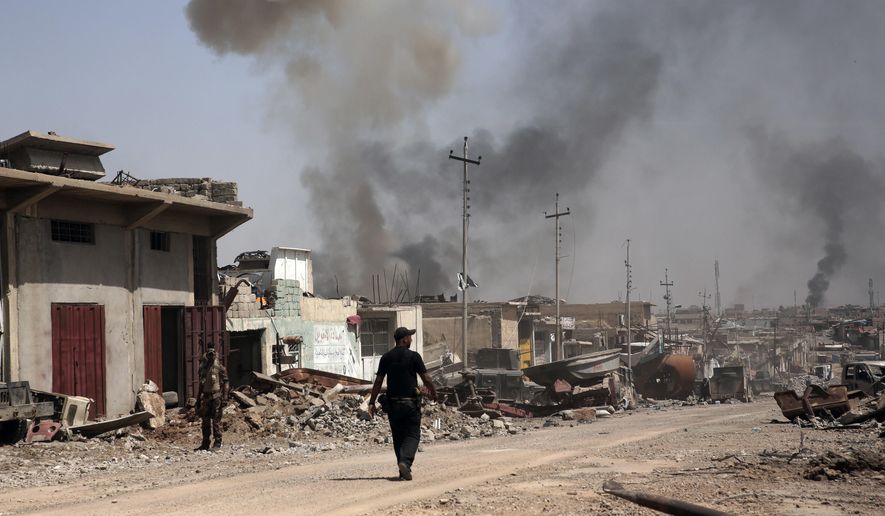The Pentagon on Tuesday warned the Iraqi militias fighting alongside Iraqi forces to liberate the Islamic State-held city of Mosul to fall in line behind commanders in Baghdad, amid rising sectarian tensions between Iranian-backed Shia militias and Kurdish peshmerga in the war-torn country.
“Everyone needs to follow [Baghdad’s] lead and fall in behind them,” Pentagon spokesman Capt. Jeff Davis said, regarding rising tensions between Shia paramilitaries known as the Popular Mobilization Units or PMUs, and peshmerga.
Capt. Davis acknowledged the challenges facing Iraqi and coalition commanders in managing such a diverse fighting force. But he reiterated the chain of command in the fight against the group known as ISIS or ISIL in Iraq runs through Baghdad, and all participants in that fight needed to respect that fact, he said during Tuesday’s briefing at the Pentagon.
His comments come as tensions have come to a head in the Yazidi enclave of Sinjar in northern Iraq’s Nineveh province this month, as PMU fighters continue to clear ISIS-held territory in and around the northern Iraqi city of Tal Afar, roughly 50 miles east of the terror group’s besieged Iraqi capital of Mosul.
Despite being accused of extrajudicial killings in previous anti-ISIS offensives in Fallujah and Anbar province, Baghdad federalized the PMUs ahead of the Mosul offensive and tasked them with leading the attack on the western flank of the city when the operation kicked off last October.
As Iraqi forces close in on the remaining ISIS redoubts in Western Mosul, PMU forces have begun liberating Yazidi-majority areas near Sinjar, despite protests by Kurdish President Massoud Barzani and local peshmerga commanders.
“We told them is not permissible to enter the areas of the [Yazidi],” Serbest Leskin, a peshmerga official in Sinjar, told Kurdish news outlet Rudlaw earlier this month.
Sinjar was the sight of the earliest U.S.-led air operations against ISIS, since the U.S. mission against the terror group began in earnest in 2014. U.S. drones and warplanes launched dozens of airstrikes against ISIS positions, clearing the way for peshmerga forces in the region to escort the besieged Yazidis stranded on Sinjar’s mountain ranges to safety.
“When we knew that they have changed their plan, we immediately informed President Barzani,” who reiterated that PMUs must stay out of Yazidi territory, or face repercussions, Mr. Leskin said.
While Sinjar and the surrounding areas technically lie outside the official borders of Iraqi Kurdistan, officials with the Kurdistan Regional Government recognize Yazidis as ethnic Kurds and claim the defense of those territories should fall to Erbil, not Iranian paramilitaries.
Shortly after the incursion of PMU fighters into Sinjar, Iraqi Prime Minister Haider al-Abadi attempted to quell tensions between the peshmerga and Iraqi military and the PMU militias under his command.
“We have agreed with the Kurdistan Regional Government on the peshmerga’s positions being limited to what they were before the start of the battle to liberate Ninevah, and our forces will carry out the operation. The text of that agreement still holds,” Mr. Abadi said in a statement, Al Monitor reported.
Serious questions remain over how Baghdad will alleviate tensions, and avoid infighting between armed groups in the ethnically diverse Nineveh province, after the fall of ISIS in Iraq. U.S.-backed Iraqi forces came a step closer to that goal this week, as the offensive to liberate western Mosul entered its 100th day.
Local forces have completely surrounded the old city district in the west and were “slowly advancing against heavy resistance” from the remaining ISIS forces still in Mosul, Capt. Davis said.
The dense, city district is home to the Mosul’s Grand Nuri Mosque, where ISIS leader Abu Bakr al-Baghdadi infamously announced the group’s new Islamic caliphate after overrunning Mosul and most of northern Iraq two years ago. It has been the sight of some of the most intense urban warfare seen by U.S. and allied forces since World War II, coalition commanders say.
• Carlo Muñoz can be reached at cmunoz@washingtontimes.com.




Please read our comment policy before commenting.